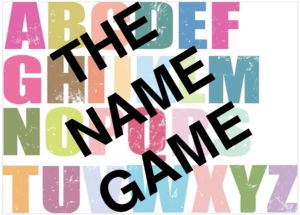While I agree that being named a Top Ten ad agency is certainly an incredible accomplishment that deserves great respect, I find it rather paradoxical at how a company can end up on Ad Age’s 2017 Agency A List and have a company name that flat out sucks? Is it just me that thinks this way, or what? What follows are five useful tips to successfully naming your brand.
According to a blog post by Kimberly A. Whitler for Forbes, the purpose of a creative ad agency is to develop and execute high-performing strategies for brands. Yet it seems that almost every company named in the Ad Age post couldn’t even get something as simple as creating their own brand names right. I’m baffled.
Take note, if marketing is about communication, then tell me precisely what a name like Widen & Kennedy or McCann is actually communicating to me? Wait, let me guess: two guys who founded the company have the last name Widen & Kennedy and another guy who founded the other company has the last name McCann. Very creative! Very safe? Very bland! Oh, and just taking the initials of the founders’ last names isn’t really any more genius. That’s how VML, a leading agency with over 3000 employees, got its name.
Wait, there’s more. Here’s another example: If I were a potential customer who stumbled upon the name Tongal, just what is it that I can expect out of the company? Tongal is not even a real word found in my trusted Merriam Webster dictionary. I know, I know, Tongal is a successful crowdsourcing company who created its name via an anagram of the name Sir Francis Galton (a scientist mentioned in the book The Wisdom of the Crowds by James Surowiecki. But, I only knew that because I read Surowiecki’s book, and, um, because I also looked it up on Wikipedia.
Wait, I’m not done: Here’s another name that conjures up images of creative advertising genius and winning strategies. NOT! Ready for it? Here goes: Laundry Service. Yup, that’s it. Laundry Service. Okay, I don’t know about you, but this doesn’t tell me a thing about what the company does, nor does it evoke any imagery other than the wet pillowcases of clothes I had to carry to the local laundromat when I was an undergrad and living in the dorms. Not really a very pleasant experience to be sure.
Okay, so I know what you’re thinking: if all the brand names I mentioned on Ad Age’s Top Ten list really are so dull, than how is it that these companies have gone on to be so successfully awesome? Is it just luck? Good question, but before I tell you, let’s at least make sure that your business starts on the right foot by creating an effective name.
What follows are five tips based on a blog post by the staff of Entrepreneur titled “How to Name a Business.” These tips are suited for companies both big and small, so be sure to pay close attention. Here it goes:
1) Tell It How It Is: If you are an ad agency, then why not use the words “agency” in your name? For instance, would you be surprised if I told you that the Konnect Agency really was an agency? Surprise! But here is a warning from the staff at Entrepreneur in their article: don’t use the abbreviation Inc. or LLC at the end of your name to sound fancy, if in fact, you really are legally none of these business entities. That could get your business into serious legal problems down the line. If that sounds like common sense advice, I shall remind my good friends that sense isn’t always so common. Believe that!
2) Tell Them What You Do: Find a name that tells your customers precisely what your agency or company does. For instance, the staff over at Entrepreneur use NameLab as an example in their article. Namelab—to no surprise—helps brands scientifically create names. There is truly not a whole lot more required to spark your interest and give you a general sense of what they do. Moving on, I personally think another good example of a descriptive name comes from a list I found of the top ad agencies in California. The name is Conversion Giant. I like the immediate imagery this name evokes: the company clearly converts prospects to customers, and they are monsters at doing it. To coin a phrase used by Neil Gabler in his New York Times’ article “The Weird Science of Naming New Products,” the name has the potential to “lodge into the public’s consciousness.” Cool!
3) Invent a Name: Given that it really is difficult to create an original name that is not already being used, the staff at Entrepreneur also recommend in their article that you put words together to invent a name that is simple and easy to understand. For instance, “Italiatour” is based on the words Italy and tour and it is used by a company that creates tours in Italy for tourists. Work for me! Now here is one of my own examples that I came across recently: Brandastic. This is clearly a combination of the words “brand” and “fantastic” to create the original name: Brandastic. And just like Italiatour, the name hints at what the company does. Brandastic helps companies create fantastic brands.
4. Conduct a Search: Last but not least, the staff of Entrepreneur in their article “How to Name a Business,” also recommends that when you think you’ve found a name you like, conduct a search to make sure it’s not already in use. This could be an involved process utilizing the Patent and Trademark Office and even trademark search companies, but for starters, just use good ol’ Google to conduct a preliminary search. Would you believe that I came up with some names that I thought were pretty cool (e.g., Ad Army, Messenger Mavens, and Brand-Aid), only to find they were all already being used by marketing companies? Bummer! Oh, and while you’re at it, if you find a name that appears not to be in use, don’t get overly excited just yet. Check to see if the URL (Uniform Resource Locator) is available. To do this, you can simply use a site like GoDaddy.
5) Hire a Naming Company: As the last step offered by the staff at Entrepreneur in the article “How to Name a Business,” one might also think about hiring a company that specializes in creating names for brands that project the right image both domestically and globally as well. This is a big business folks! As previously mentioned, the company NameLab is a leading company in this space—so is Catchword and A Hundred Monkeys. In fact, Namelab worked for the mega brands Compaq and Acura. Yup, they helped invent those brand names. But that being said, note that naming companies can be very pricey—as much as $75,000 for the name, logo, trademark search, and registration fees. Yikes!
Now here are a few more of my very own tips that the folks at Entrepreneur forgot to add: make sure the name is positive and non offensive, make sure the name looks cool on a T-shirt (hat, building, etc.), make sure the name is easy to read/spell/pronounce, and make sure that your name tests well with your target customer—it’s not about what you think.
Okay, so before I leave you, there is still that one pressing issue that I haven’t addressed and I know it is on all of your minds. Here it is again: If all the brand names I mentioned on Ad Age’s Top Ten list really do suck so badly, then why have these companies gone on to be so successful? Um, ah, great question! This just comes to prove an important point about the concept of branding.
Branding is the process of projecting a clear, consistent, believable, and relevant identity with the intention of leaving a positive image in the minds of the customers. Branding involves much more than just creating a name. Branding can also require a logo, slogan, mascot, spokesperson, attitude, fancy building, dress code, work ethic, customer service policy, customer experience, and a portfolio of expert work that you can or have already delivered to target customers. Whichever of these branding elements you use, (and I certainly hope you at least start with the last one—a great product or service) they must all be executed in an integrated manner over time to tell one clear and consistent story. Just in case that wasn’t clear, understand that striving to create a great name is important and having one can certainly help elicit attention and hold interest in the crowded marketplace (especially for new and still unknown companies), but a name alone won’t make or break a company. To be sure, I’ll say that again: a name alone won’t make or break a company. Ad Age’s 2017 Agency A List is proof of that.
So, stay tuned for future postings where I will discuss other branding elements like logos, slogans, and spokespersons and how all these elements work together in an integrated manner. Okay?
Wait, who am I? Well don’t worry, I’m really not the critical jerk that I made myself out to be in this post. I was just trying to get your attention! I truly hope you enjoyed the post.
In any case, that’s all for now. And remember, if you want to make it, you have to market. Fight on all.
—Bobby Borg www.bobbyborg.com



15 Responses to Ad Agency Names That Suck: 5 Tips To Preventing This Fate